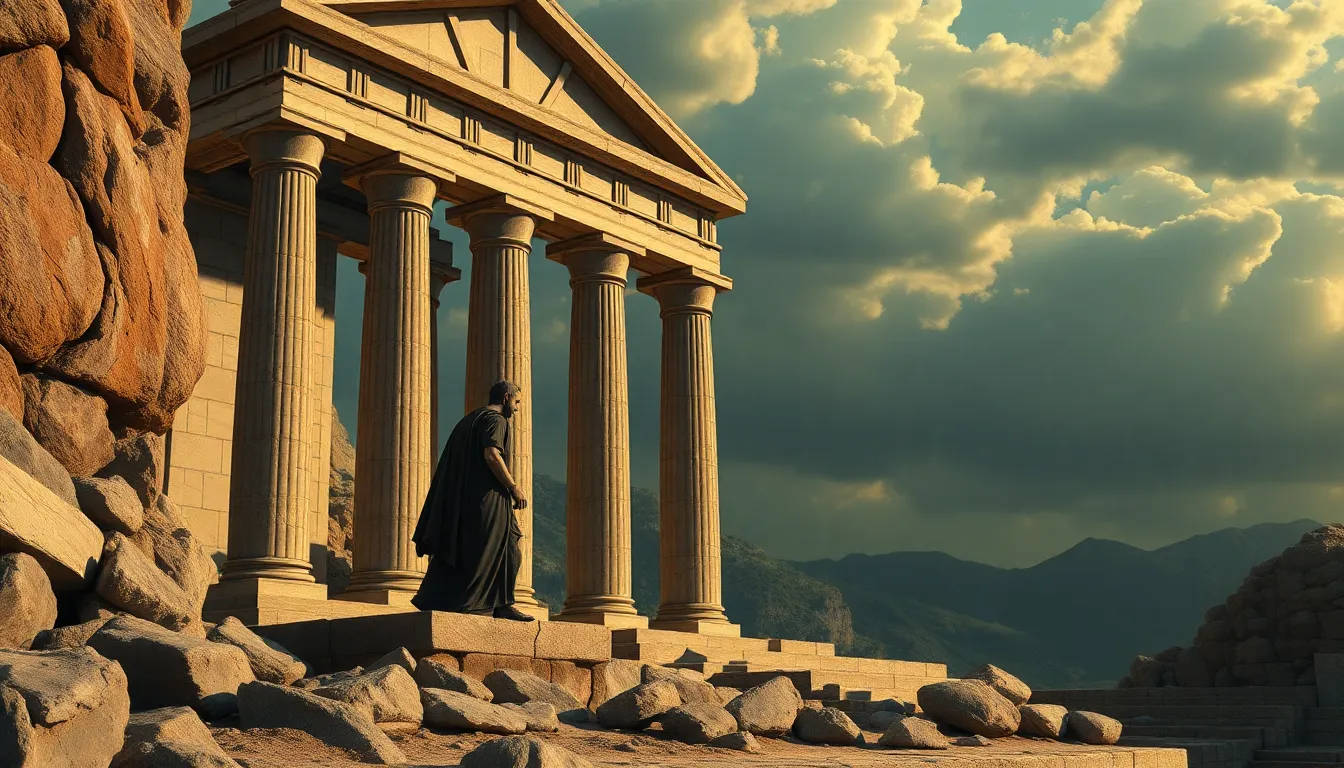A Day in the Life of a Mortal in the Shadow of Greek Gods
I. Introduction
Greek mythology is a rich tapestry of stories woven around a vast pantheon of gods and goddesses, each embodying different aspects of life and the universe. From the mighty Zeus, king of the gods, to the wise Athena, goddess of wisdom, these divine beings played crucial roles in the lives of mortals.
The narratives of Greek mythology often emphasize the significance of mortals, who, despite their limitations, navigate a world influenced by the whims of the divine. This article aims to explore the daily life of an ancient Greek mortal, illustrating how they lived under the ever-watchful gaze of the gods.
II. Morning Rituals: A Mortal’s Awakening
As dawn breaks over the hills of ancient Greece, the first rays of sunlight are seen as a divine signal from Helios, the sun god. The light signifies the start of a new day filled with potential and challenges.
Mornings often begin with rituals that honor the gods. Mortals might rise early to offer prayers and small sacrifices at household altars, calling upon deities such as Hestia for warmth and protection, or Demeter for a fruitful harvest.
Daily chores intertwine the mundane with the sacred. Tasks such as tending to livestock, preparing meals, and weaving textiles are not merely duties but acts of devotion. Each action is performed with the recognition that the gods are present, influencing outcomes and fortunes.
III. The Influence of the Gods on Daily Activities
The lives of ancient Greeks were heavily influenced by the whims of the gods, particularly in agricultural practices. For instance, the changing seasons were often interpreted as signs of divine favor or displeasure, guiding farmers on when to plant and harvest.
- Divine Influence on Agriculture: Farmers would pray to Demeter for a bountiful harvest, and rituals would be performed to appease her.
- Role of Oracles: Oracles, such as the famous Pythia at Delphi, were consulted for guidance on important decisions, from warfare to personal matters.
Superstitions and rituals were common as mortals sought to curry favor with the gods. These could include:
- Offering small tokens or food items.
- Performing specific actions believed to please the gods, like avoiding certain foods on particular days.
IV. Community Life: Festivals and Gatherings
Community played a vital role in honoring the gods and fostering social bonds among mortals. Festivals dedicated to deities were significant events that brought people together, celebrating their shared beliefs and cultural identity.
One such festival might be the Panathenaea, held in honor of Athena, featuring processions, athletic competitions, and feasts. The atmosphere is filled with excitement and reverence, as people participate in:
- Parades showcasing offerings to the goddess.
- Games that test strength and skill, reflecting the competitive spirit favored by gods like Zeus.
Social dynamics are often influenced by these gatherings, as relationships and rivalries can be shaped by the gods’ favor or disfavor. Mortals find themselves navigating a complex web of social interactions, all under the watchful eyes of their deities.
V. Challenges Faced by Mortals
Living in the shadow of the gods is not without its challenges. The capricious nature of divine beings often leads to struggles for mortals, who must contend with the unpredictable whims of fate.
Tales of divine retribution are common, illustrating the potential consequences of offending the gods. Mortals face suffering and hardship as a result of these deific actions, reminding them of their vulnerability.
To cope with these challenges, Greeks turned to myths and stories that provided hope and resilience. Narratives of heroes overcoming divine obstacles served as a source of inspiration and comfort:
- Stories of Odysseus’ cleverness in outsmarting gods.
- Myths of Hercules and his labors showcasing human strength against divine adversity.
VI. Evening Reflections: The Mortal’s Perspective
As the sun sets, mortals gather to share stories and reflect on their day. Storytelling becomes a vital means of processing experiences and reinforcing cultural values.
The relationship between mortals and gods is complex, filled with fear, reverence, and hope. Mortals often grapple with their agency in a world dominated by divine influence, pondering existential questions about fate and free will.
Evening reflections may lead to personal insights, where individuals consider their actions and how they align with the expectations of the gods, fostering a sense of accountability and connection to the divine.
VII. The Legacy of Mortals in Greek Mythology
Throughout Greek mythology, notable mortal figures have emerged who either defied or befriended the gods, leaving lasting legacies. These figures, such as Prometheus and Perseus, demonstrate the complexities of the mortal experience.
The narratives of these mortals have significantly impacted Greek culture and literature, shaping philosophical discussions and artistic expressions. Their stories resonate with themes of struggle, triumph, and the search for meaning.
Even in modern contexts, the lessons from these ancient tales continue to inspire individuals to confront their own challenges and explore their relationships with the divine.
VIII. Conclusion
The daily life of mortals in ancient Greece was a complex interplay of the mundane and the divine. Living in the shadow of gods shaped their experiences, beliefs, and social dynamics, creating a rich cultural tapestry that continues to fascinate.
The enduring fascination with the interactions between mortals and deities invites us to explore our own “myths” in daily life, recognizing the divine influences that shape our paths. As we navigate our own challenges and triumphs, we can draw inspiration from the ancient Greeks who looked to the heavens for guidance and meaning.




